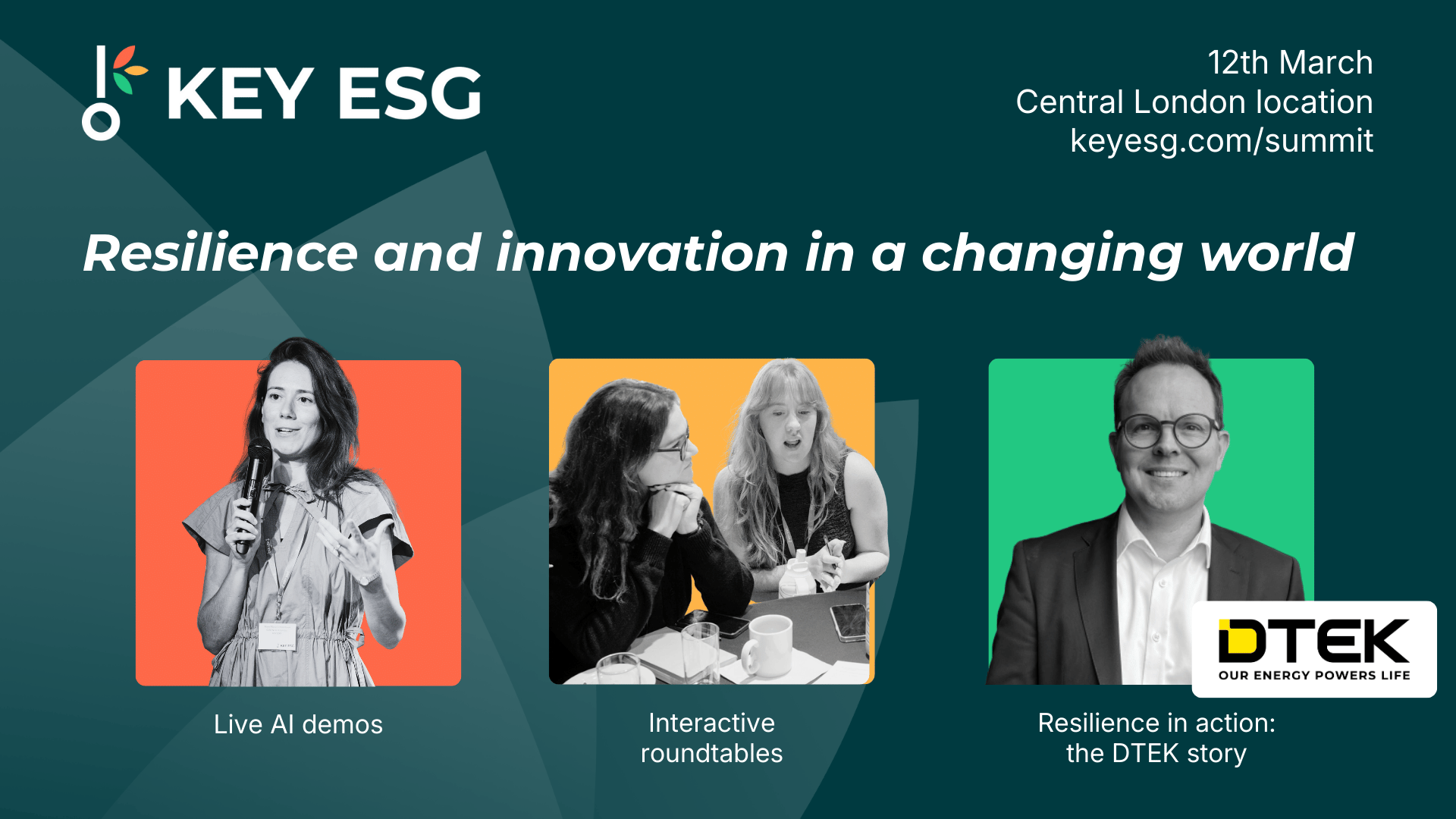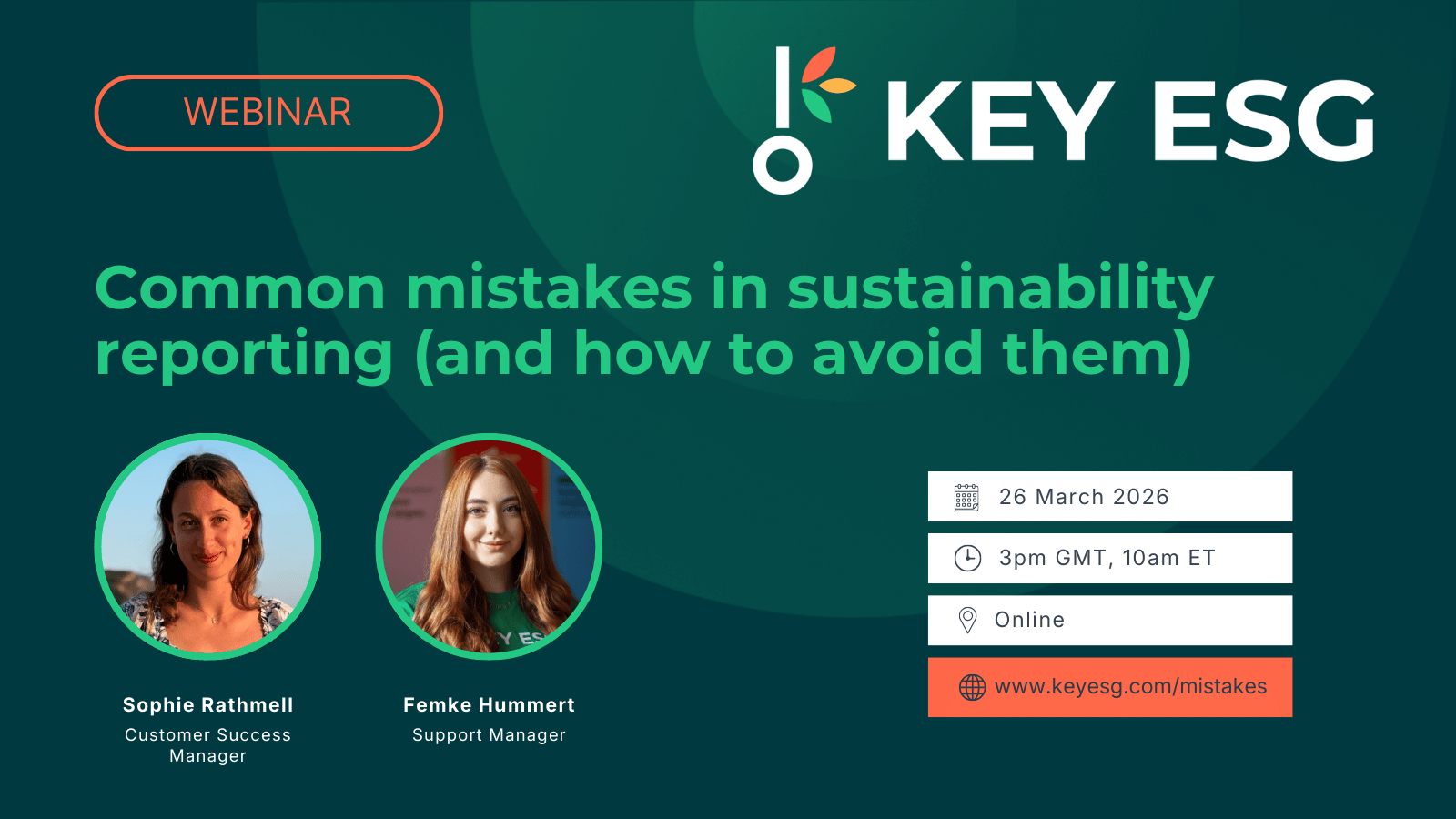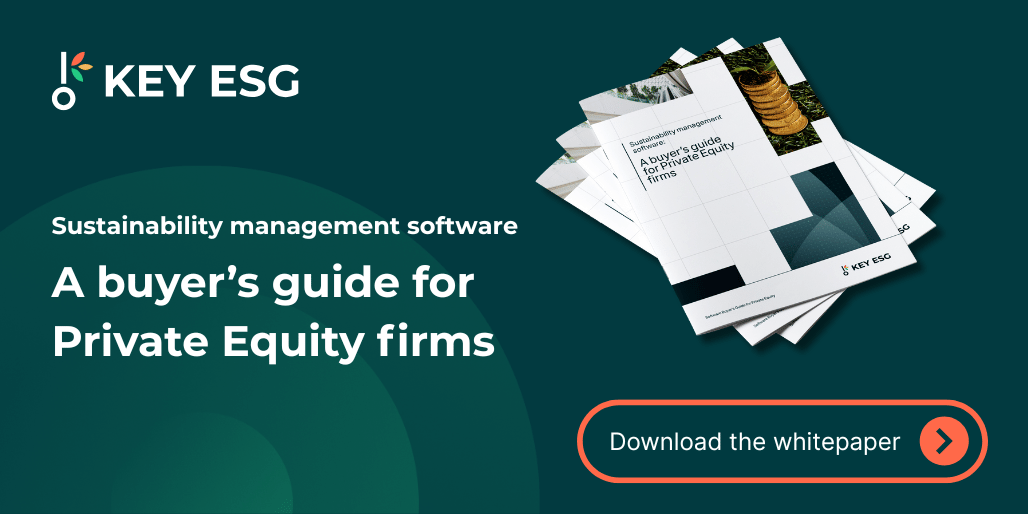Managing ESG along the Investment Cycle
Published: 5 Jul 2022 · Last updated: 10 Oct 2023
ESG is becoming increasingly important for private equity (PE) investors. More and more general partners (GPs) are taking a proactive approach to sustainability to appease the demands of limited partners, regulators, customers, and management teams. These efforts span the entire investment cycle; from due diligence, to the holding period, and right through to exit.
To help us understand how private equity firms are enforcing these changes, KEY ESG spoke to over 30 private equity managers. We asked them how they integrate ESG management across the different phases of the investment life cycle to achieve growth. This is what we discovered.
But first:
What are the Phases of the Investment Life Cycle?
Due Diligence
The due diligence phase involves the investor screening the ESG performance of a potential investment prior to making a decision. This screening often enables a private equity firm to determine the degree of ESG risk associated with the investment. Any issues identified during this phase become the focus of ESG management efforts during the holding period.
Holding Period
ESG targets and initiatives are established throughout the holding period. A 100-day plan is created to ensure improvements are made in a timely manner.
Exit
The efforts made to manage ESG issues throughout the holding period of the investment cycle should reduce risk and enhance the company’s value. The value generated through the improvement of ESG performance is captured upon exit, and ESG strategies and results are incorporated into the equity story.
Due Diligence and ESG Performance Screening
Identifying risks and opportunities upfront helps managers to avoid investing capital in businesses that carry considerable ESG risks.
Our analysis of private equity investors’ decisions revealed that many managers now screen the ESG performance of a potential investment before making a purchase. This screening is usually carried out during the due diligence phase, and it often involves administering ESG questionnaires. The questions asked vary in terms of how much detail they go into, but their overarching aim is to determine 2 things:
- Where the business needs to improve in terms of its ESG processes.
- How much it would cost to mitigate the company’s existing ESG risks.
The answers to these questions allow private equity investors to deduce whether or not an investment is a sensible one. In our research, we observed that an increasing number of managers’ investment proposals featured the outcomes of ESG due diligence. These matters now underpin investment decision-making and value-creation considerations.
Any responsible investor looking to create a sustainable portfolio and earn a high return seeks to increase their revenue and reduce costs and liabilities. As ESG performance disclosure requirements become more and more comprehensive, ESG is gradually inching closer to the top of investors’ priority lists.
This prioritisation isn’t exclusive to GPs and private equity managers. New legislation on ESG means that Limited Partners (LPs) have begun to review whether or not private equity managers consider ESG when investing. ESG performance is thus often viewed as a means of futureproofing an investment.
ESG metrics can also aid negotiations with lenders during the due diligence period. This provides another incentive for private equity managers to assess ESG early when making investments. Download our whitepaper to learn more.

Successful ESG Management and Value Creation during the Holding Period
Our industry research revealed that, once an investment has been made, most private equity managers begin by setting out a 100-day plan of action. They work closely with their portfolio companies’ management teams, and any changes they want to make to the business to enable it to create more value are addressed.
More and more managers are looking to establish the foundations for ESG management early on in the investment period. To do this, they include ESG targets and considerations in these 100-day plans.
Early planning for ESG measurement makes sense. Some ESG victories, such as recycling protocols, solar panel installations, and packaging modifications, can pay off quite quickly. However, many ESG action items take several years to have any real impact. To maximize value creation arising from ESG performance improvement, sensible managers plan ahead and take ESG action early on during the holding period.
Effective ESG management during the holding period is reliant on three things:
- Frequent data collection and metric calculations
- Clear and well-structured reporting systems
- Good communication between private equity managers and portfolio company managers
To facilitate this, we found that many private equity managers elected ‘ESG Leads’ within their portfolio companies. Some managers have also started to integrate ESG targets into portfolio management teams’ bonuses and Long-Term Incentive Plans (LTIPs). This helps management to adequately balance top and bottom-line targets with ESG goals.
Our whitepaper outlines the best practices to adopt in order to achieve this.
How ESG Management shapes Exit Strategies
With an increasing number of buyers screening for ESG performance, private equity managers need to consider how ESG performance might impact their exit outcomes. If an initial public offering (IPO) is on the horizon, putting together the necessary ESG disclosures can be time-consuming. Especially if the portfolio company has not previously been collecting this data. This can slow down an exit process drastically.
Investors and stakeholders in the public market will often pay an “ESG premium” if you have data to support your investment’s strong ESG performance. Demonstrating the improvements made during the holding period can reveal the total long-term value of your portfolio. This can also evidence the potential for the buyer to generate future value from further ESG performance development. Read more about this in our whitepaper.
How Private Equity Investors can tick all the boxes
Using insights from our conversations held with private equity managers, KEY ESG has worked in partnership with clients to create a suite of software solutions. We optimise data collection methods, allowing private equity investors to manage ESG information effectively across every stage of the investment cycle.
Robust ESG management requires the collection of a substantial amount of data across a range of different portfolio company divisions. ESG metrics must be curated, targets must be set, and reporting routes need to be established. Performing all this work manually is often resource-intensive and time-consuming. It can also lead to non-uniform measurements across the portfolio, meaning that metrics can’t be compared.
KEY ESG software automates and standardises many of these processes, allowing private equity managers to speed up ESG management and focus on value creation.
How does it work?
Due Diligence Screening Tools
KEY ESG software sends tailored ESG questionnaires to potential targets. Feedback is collected digitally and stored securely. ESG metrics are automatically calculated and displayed on a user-friendly dashboard.
Over time, private equity managers can build their own internal benchmarks for comparison. They might also choose to extend KEY ESG software to their portfolio companies through active buy-and-build strategies. This supports future integrations and helps ESG Leads to save time and resources.
The Fund Manager Platform
With the Fund Manager platform, managers can send out data requests to all portfolio companies and follow their workflow progress along the way. They can review automatically calculated and comparable ESG metrics, and aggregate and compare performance across their portfolio.
The platform enables investors to track progress alongside their targets and benchmarks. Reports are created instantly for internal board packs and LP updates.
The Company Platform
Each portfolio company can be assigned a specific portal. Through these portals, managers submit their raw ESG data and underlying source materials for future audit-trail purposes.
This keeps each portfolio company’s ESG data in one place and ensures metrics are standardised across an investor’s entire portfolio. ESG progress is tracked against targets through automated ESG dashboards, and comparisons are easily made between different investments.

Want to learn more?
Download our whitepaper on managing ESG along the private equity investment life cycle. In it, we expand on each of the above points and develop a reference document. Review our key tips for each phase of the investment process and discover more of our professional insights from conversations with private equity managers.
If you have any questions, or you’d like to book a demo, get in touch with a member of our team. Whether you’re ESG savvy or you’re still Googling what ESG stands for, our experts are on hand to help.
Managing ESG along the Investment Cycle
Published: 5 Jul 2022 · Last updated: 10 Oct 2023
ESG is becoming increasingly important for private equity (PE) investors. More and more general partners (GPs) are taking a proactive approach to sustainability to appease the demands of limited partners, regulators, customers, and management teams. These efforts span the entire investment cycle; from due diligence, to the holding period, and right through to exit.
To help us understand how private equity firms are enforcing these changes, KEY ESG spoke to over 30 private equity managers. We asked them how they integrate ESG management across the different phases of the investment life cycle to achieve growth. This is what we discovered.
But first:
What are the Phases of the Investment Life Cycle?
Due Diligence
The due diligence phase involves the investor screening the ESG performance of a potential investment prior to making a decision. This screening often enables a private equity firm to determine the degree of ESG risk associated with the investment. Any issues identified during this phase become the focus of ESG management efforts during the holding period.
Holding Period
ESG targets and initiatives are established throughout the holding period. A 100-day plan is created to ensure improvements are made in a timely manner.
Exit
The efforts made to manage ESG issues throughout the holding period of the investment cycle should reduce risk and enhance the company’s value. The value generated through the improvement of ESG performance is captured upon exit, and ESG strategies and results are incorporated into the equity story.
Due Diligence and ESG Performance Screening
Identifying risks and opportunities upfront helps managers to avoid investing capital in businesses that carry considerable ESG risks.
Our analysis of private equity investors’ decisions revealed that many managers now screen the ESG performance of a potential investment before making a purchase. This screening is usually carried out during the due diligence phase, and it often involves administering ESG questionnaires. The questions asked vary in terms of how much detail they go into, but their overarching aim is to determine 2 things:
- Where the business needs to improve in terms of its ESG processes.
- How much it would cost to mitigate the company’s existing ESG risks.
The answers to these questions allow private equity investors to deduce whether or not an investment is a sensible one. In our research, we observed that an increasing number of managers’ investment proposals featured the outcomes of ESG due diligence. These matters now underpin investment decision-making and value-creation considerations.
Any responsible investor looking to create a sustainable portfolio and earn a high return seeks to increase their revenue and reduce costs and liabilities. As ESG performance disclosure requirements become more and more comprehensive, ESG is gradually inching closer to the top of investors’ priority lists.
This prioritisation isn’t exclusive to GPs and private equity managers. New legislation on ESG means that Limited Partners (LPs) have begun to review whether or not private equity managers consider ESG when investing. ESG performance is thus often viewed as a means of futureproofing an investment.
ESG metrics can also aid negotiations with lenders during the due diligence period. This provides another incentive for private equity managers to assess ESG early when making investments. Download our whitepaper to learn more.

Successful ESG Management and Value Creation during the Holding Period
Our industry research revealed that, once an investment has been made, most private equity managers begin by setting out a 100-day plan of action. They work closely with their portfolio companies’ management teams, and any changes they want to make to the business to enable it to create more value are addressed.
More and more managers are looking to establish the foundations for ESG management early on in the investment period. To do this, they include ESG targets and considerations in these 100-day plans.
Early planning for ESG measurement makes sense. Some ESG victories, such as recycling protocols, solar panel installations, and packaging modifications, can pay off quite quickly. However, many ESG action items take several years to have any real impact. To maximize value creation arising from ESG performance improvement, sensible managers plan ahead and take ESG action early on during the holding period.
Effective ESG management during the holding period is reliant on three things:
- Frequent data collection and metric calculations
- Clear and well-structured reporting systems
- Good communication between private equity managers and portfolio company managers
To facilitate this, we found that many private equity managers elected ‘ESG Leads’ within their portfolio companies. Some managers have also started to integrate ESG targets into portfolio management teams’ bonuses and Long-Term Incentive Plans (LTIPs). This helps management to adequately balance top and bottom-line targets with ESG goals.
Our whitepaper outlines the best practices to adopt in order to achieve this.
How ESG Management shapes Exit Strategies
With an increasing number of buyers screening for ESG performance, private equity managers need to consider how ESG performance might impact their exit outcomes. If an initial public offering (IPO) is on the horizon, putting together the necessary ESG disclosures can be time-consuming. Especially if the portfolio company has not previously been collecting this data. This can slow down an exit process drastically.
Investors and stakeholders in the public market will often pay an “ESG premium” if you have data to support your investment’s strong ESG performance. Demonstrating the improvements made during the holding period can reveal the total long-term value of your portfolio. This can also evidence the potential for the buyer to generate future value from further ESG performance development. Read more about this in our whitepaper.
How Private Equity Investors can tick all the boxes
Using insights from our conversations held with private equity managers, KEY ESG has worked in partnership with clients to create a suite of software solutions. We optimise data collection methods, allowing private equity investors to manage ESG information effectively across every stage of the investment cycle.
Robust ESG management requires the collection of a substantial amount of data across a range of different portfolio company divisions. ESG metrics must be curated, targets must be set, and reporting routes need to be established. Performing all this work manually is often resource-intensive and time-consuming. It can also lead to non-uniform measurements across the portfolio, meaning that metrics can’t be compared.
KEY ESG software automates and standardises many of these processes, allowing private equity managers to speed up ESG management and focus on value creation.
How does it work?
Due Diligence Screening Tools
KEY ESG software sends tailored ESG questionnaires to potential targets. Feedback is collected digitally and stored securely. ESG metrics are automatically calculated and displayed on a user-friendly dashboard.
Over time, private equity managers can build their own internal benchmarks for comparison. They might also choose to extend KEY ESG software to their portfolio companies through active buy-and-build strategies. This supports future integrations and helps ESG Leads to save time and resources.
The Fund Manager Platform
With the Fund Manager platform, managers can send out data requests to all portfolio companies and follow their workflow progress along the way. They can review automatically calculated and comparable ESG metrics, and aggregate and compare performance across their portfolio.
The platform enables investors to track progress alongside their targets and benchmarks. Reports are created instantly for internal board packs and LP updates.
The Company Platform
Each portfolio company can be assigned a specific portal. Through these portals, managers submit their raw ESG data and underlying source materials for future audit-trail purposes.
This keeps each portfolio company’s ESG data in one place and ensures metrics are standardised across an investor’s entire portfolio. ESG progress is tracked against targets through automated ESG dashboards, and comparisons are easily made between different investments.

Want to learn more?
Download our whitepaper on managing ESG along the private equity investment life cycle. In it, we expand on each of the above points and develop a reference document. Review our key tips for each phase of the investment process and discover more of our professional insights from conversations with private equity managers.
If you have any questions, or you’d like to book a demo, get in touch with a member of our team. Whether you’re ESG savvy or you’re still Googling what ESG stands for, our experts are on hand to help.






